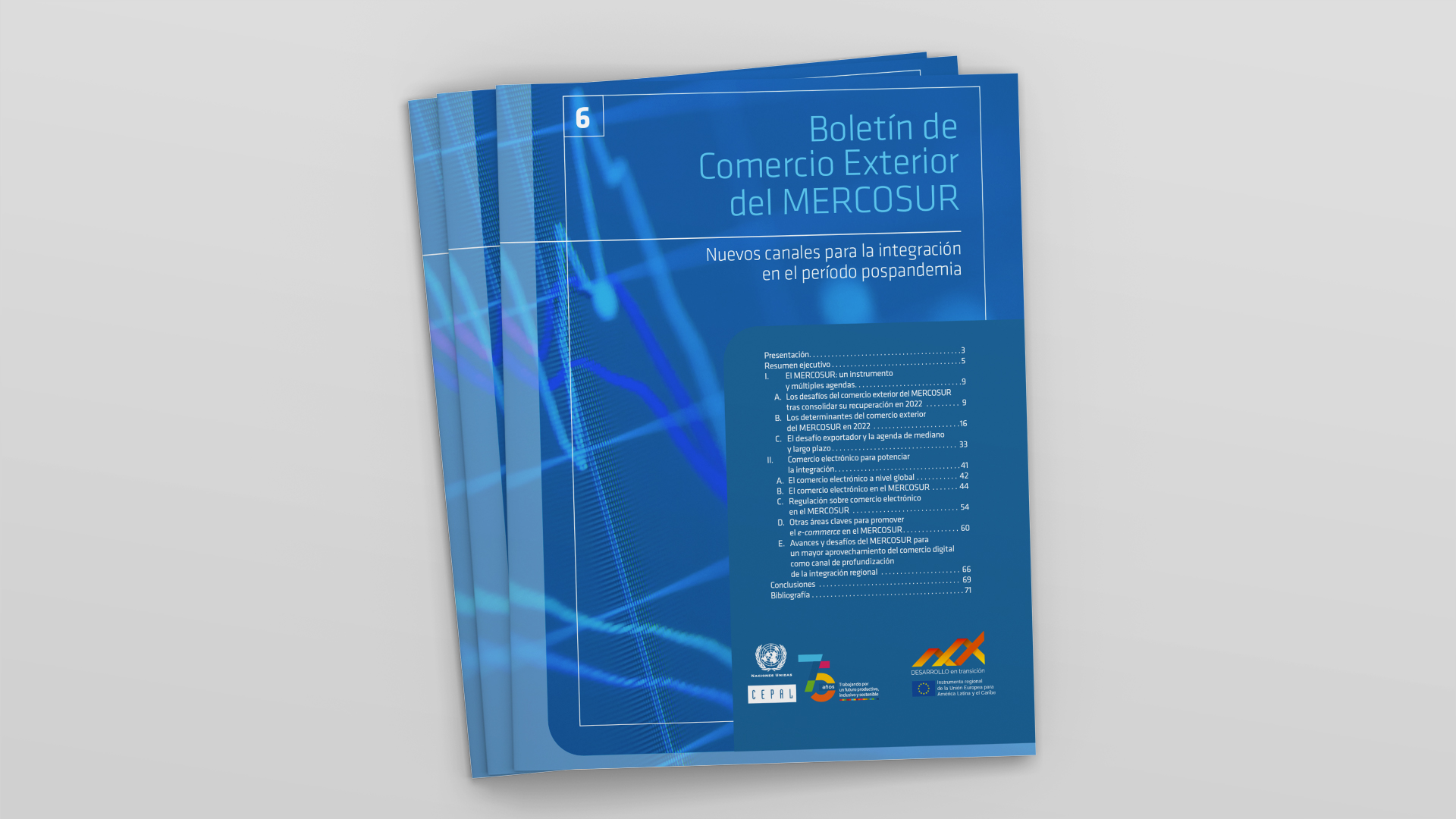MERCOSUR’s Exports Recover from the Pandemic’s Effects, Rising 18.2% in 2022
Work area(s)
New edition of the bloc’s Foreign Trade Bulletin, prepared by ECLAC, indicates that the challenges for 2023 continue to be linked to strengthening domestic space in the pursuit of greater productive integration.

Exports of goods from the Southern Common Market (MERCOSUR) increased by 18.2% in 2022 and surpassed their 2019 level by 43.9%, driven by the notable rise in commodity prices due to the war in Ukraine, coupled with a 3.2% increase in volume, the Economic Commission for Latin America and the Caribbean (ECLAC) indicates in a new document released today.
In a new edition of the Foreign Trade Bulletin of MERCOSUR (No. 6): “New channels for integration in the post-pandemic era”, ECLAC reports that MERCOSUR experienced 1.3% growth in economic activity (2.0% upon including Venezuela) in 2022, which was less than the previous year, in line with the slowdown in the global economy.
According to the United Nations regional organization, the value of imports also rose significantly last year. Based on growth in economic activity, the volume of purchases from abroad rose 4.0% during the year, while an increase in international prices – especially for energy and fertilizer – led to a 20.1% jump in the price of imports, prompting a 24.9% overall rise in the value imported by the subregion.
“The challenges in 2023 continue to be linked to strengthening domestic space in the pursuit of greater productive integration that would promote diversification, export growth, and increased participation in modern and digital services,” the document underscores.
According to the publication, foreign trade in services, which had not overcome the setbacks suffered due to the COVID-19 pandemic, ultimately recovered in 2022 thanks to the impetus of tourism activities, both outbound and inbound; the vitality of modern services; and the increase in transportation costs. Service exports and imports grew by 33.4% and 40.9%, respectively.
The recovery of trade in services, which structurally has generated deficits for MERCOSUR, prompted a negative outcome for the bloc of 1.8% of GDP, which was fully compensated by the surplus achieved in the trade of goods. This expressed itself in a balanced overall trade balance, after two years of surplus.
In 2023, ECLAC forecasts greater challenges for MERCOSUR’s economic activity and foreign trade in a context of low international growth, declining prices for commodity exports, and sustained international conflict. This is compounded by the negative effects on agricultural production caused by drought in Argentina and Uruguay, although the bloc’s level could be offset by a good performance in Brazil’s sector.
The Commission warns that growth in the quantity exported by the bloc in the last decade was just 2.1% per year, below the volume of global exports (2.8% annually), and that the performance of MERCOSUR’s sales abroad depends on the impact of prices for international products and climate conditions, thereby reflecting the vulnerability resulting from an insertion in global markets that is highly concentrated on natural resources in all of the bloc’s countries.
In line with this Bulletin’s prior editions, it is emphasized that the growing primary specialization is associated largely with a decline in trade within the bloc, which continued to lose ground as a share of the total, reaching a historic low of 10.5% of total sales abroad in 2022, while destinations outside the bloc – such as the Pacific Alliance, the European Union, Asia (with the exception of China, where import volumes declined as a result of its “zero-COVID” policy) and the United States – gained ground.
Thus, in this new edition of the Foreign Trade Bulletin of MERCOSUR, ECLAC addresses new strategies to enhance integration, focusing on the opportunities posed by e-commerce. Given that MERCOSUR is one of the regions with greater vitality in e-commerce at a national level, and that it was a pioneer in the region regarding the inclusion of digital trade on its agenda, the effective progress on e-commerce among the bloc’s members is still limited.
Taking advantage of existing agreements requires overcoming various types of obstacles in terms of regulations, restrictions on service imports or on making purchases on platforms in another of the bloc’s countries, and making payments to trade partners abroad, the organization indicates. The report stresses the need to improve connectivity, strengthen digital skills and access to information and to electronic devices, while also making progress on trade logistics and facilitation, particularly regarding the interoperability of payment systems. This agenda must also promote financial inclusion and support the digitalization and internationalization of SMEs.
Finally, the Commission warns that in addition to trade facilitation and greater regulatory harmonization, efforts to deepen regional integration require a more ambitious agenda for articulating countries’ strategies. This agenda must be backed by policies for productive transformation that would allow for exploiting the complementarities between member countries, diversifying demand for goods and services within the bloc and, thereby, the full set of their exports on offer.
Related content
Subregional headquarter(s) and office(s)
Type
Country(ies)
-
Argentina
-
Brazil
-
Paraguay
-
Uruguay
-
Venezuela
Contact
Oficina de la CEPAL en Buenos Aires
- cepalbue@cepal.org
- (54 11) 5436 4000